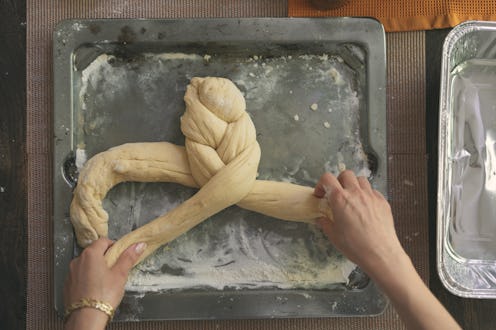Life
My Social-Distancing Project Soothes My Anxiety. Posting It On Instagram? Not So Much.

On day 13 of social distancing, my kitchen is empty enough to rationalize going for a grocery run. As I return with 10 pounds of flour, frozen vegetables, and no toilet paper, I notice a package has been delivered — my brotform!, I realize, delighted. Tomorrow, I can finally bake with the sourdough starter I began cultivating on day three.
Yes, I am now a bread person, one of the many varieties of monster who decides to take up a “social-distancing project” to “stay productive” for the “foreseeable future.” Just as natural yeast colonizes a levain, we’ve taken over your Instagram Stories to document our industrious progress in all things DIY; bread-baking, knitting, light home improvement. “Shakespeare wrote King Lear while quarantined!” we retweet. “Newton invented calculus!”
The reason I’m referring to our kind so, uh, unkindly is that performative productivity has emerged as a toxic scourge of social distancing. It’s hard enough to get through the day when there’s so much uncertainty, so much warranted worry; you shouldn’t put pressure on yourself to invent a new kind of math, too. “But you have so much extra time!” moms everywhere helpfully offer, not realizing that that extra time is already fully booked with anxiously refreshing the news, Real Housewives reruns, napping, and literally anything else it takes to make it through these unprecedented times.
Every one of these coping mechanisms, by the way, is 100% valid, Dr. Navya Singh, adjunct psychology faculty at Columbia University and founder of digital mental health platform wayForward, tells Bustle.
“What’s ‘productive’ is subjective,” Singh says. Someone who “just cannot sit still” might pour their energy into a new project; “maybe getting that extra hour of sleep you’ve been wanting for seven years is contributing to your ‘productivity’ or self-care, which is critical during this time.”
For me, cooking and baking have always been coping mechanisms when my anxiety flares; it gets me off of my phone, for one, and fills me with pride when I turn out a perfectly formed olive-oil cake. I also have to eat, so I might as well make something good. Posting the results of these kitchen experiments to Instagram stories is me seeking validation in the form of those little fire emojis, yes, but is it really so wrong to want validation (aka human interaction) right now?
While practicing social distancing, people are spending a lot more time on social media, “if not living through it completely,” Singh says. “It can reduce anxiety because you can have a community to share with, in this way that we’re allowed to interact right now.” Singh adds that a lot of posts can have positive impacts on others, pointing to people raising awareness about staying home to flatten the curve, or even inspiring others to do something new themselves.
Still, I’ve read enough derisive jokes about bread people to know that not everyone gets inspired by seeing acquaintances bake focaccia. And if there are any negative sides to social media (just kidding, there are so many), it’s that it opens up the door to judge and be judged. Look at me, judging myself!
The only thing we can do, really, is cut ourselves some slack. “Right now, everybody has to do what works for them,” Jennifer Murayama, LCSW, a licensed clinical psychotherapist with Alma and teaching faculty at the Ackerman Institute for the Family, tells Bustle. “We're human. We're going to have reactions, judgments to other people based on our differences.”
In the best of times, social media is a snakepit of anxiety, an ouroboros of overthinking. We are, to put it generously, not in the best of times. Being kind to each other — and to ourselves — about what we’re posting or not, what we’re doing or not, is part of what it means to be all in this together.
Experts cited:
Dr. Navya Singh, adjunct psychology faculty at Columbia University and founder of digital mental health platform wayForward
Jennifer Murayama, LCSW, a licensed clinical psychotherapist with Alma and teaching faculty at the Ackerman Institute for the Family